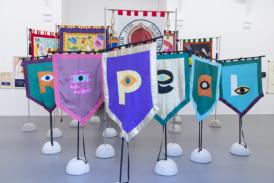
In recent years, artists in Ireland have taken part in and sometimes spearheaded the campaigns for Marriage Equality (2015) or for abortion rights (2018) through collectives like the Artist’s Campaign to Repeal the Eight, and, with Brexit looming large, artists have initiated participatory projects with local border communities. The question of human rights has been central to artistic creation in Northern Ireland since the mid-1990s however, with the channeling of European funds through international bodies and the Special European Union Programmes Body (SEUPB) leading to the professionalization of community arts and the growth of socially engaged arts projects.
On the European scale, the involvement of arts organizations in cultural networks such as Trans Europe Halles (TEH) or Caravan has contributed to anchoring Irish arts in Europe and strengthening partnerships among practitioners championing social engagement and the defence of Human Rights. Programmes such as Creative Europe have allowed artists’ collectives to obtain funding for transnational projects reaching out to communities regardless of national border (‘Corners of Europe’, 2010 and 2016).
Have these initiatives had a lasting impact, and what have been the challenges in implementing the recommendations of the UNHC’s High Commission to “increas[e] social interactions, mutual understanding and trust that can be built or rebuilt through these initiatives”?
In a time that calls for “response-ability” (R. Braidotti, The Posthuman, 2013) this conference seeks to explore creative practices and processes in Irish visual and performing arts, whether they are “disruptive and interventionist [or…] constructive and ameliorative” (Participation, Documents on Contemporary Art, 2006). It will also offer an opportunity to critically assess artistic modalities, as well as political and cultural agendas, in a context of growing distrust for representative democracy which often demands increased awareness of the artist’s own vulnerability in creating a common “we” (Guillaume Leblanc, Que faire de notre vunérabilité?, 2011).
The organisers invite submissions for papers exploring the forms and challenges met by participatory contemporary arts in Ireland. Possible topics include, but are not limited to :
- Engagement with issues of citizenship through education and institutions; activism and militant art ; participation and representation.
- Subjectivity and authorship or authorial control (artist collectives, single artists), ownership and contents creation ; legitimacy ; agency and control.
- Social and cultural interactions in order to address rights and discriminations based on gender, age, sexual orientation, nationality, origins, skin colour, religion, disabilities, class, education, language.
- The social dimension of the posthuman through local, national and international solidarities and political and social initiatives ; the entanglement of the human and the environment, climate action, borders.
- Artistic models and methods : research-creation, residencies and artistic communities or collaborations, curatorial practices ; cross-overs of arts and sciences, new media or materials archives and conservation; public and site-specific works, experimentations.
- Impact and traces of the art event : how the performance is remembered, exhibited, documented, curated, archived.
Confirmed invited speakers and artists
- Anne Cleary and Denis Connolly, artists, Paris and Ireland
- Rachel Fallon, visual artist, Rua Red Gallery, Tallaght
- Fiona Kearney, director of The Glucksman Gallery, University College Cork
- Tom Magill, artistic director, ESC Films, Belfast
This conference is organized under the auspices of GIS EIRE and of CRBC (U. Rennes), with the participation of LISAA (Université Gustave Eiffel), TIL (U. Bourgogne).
